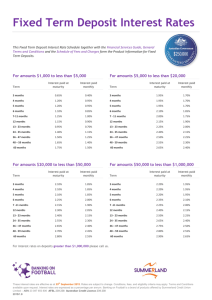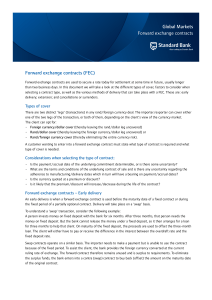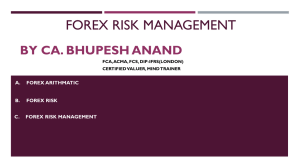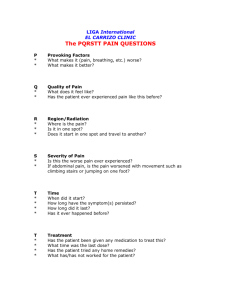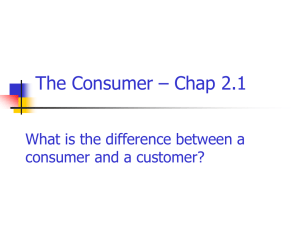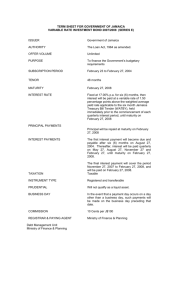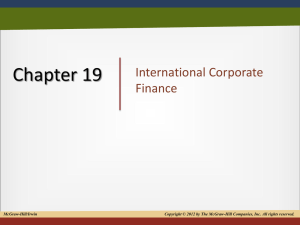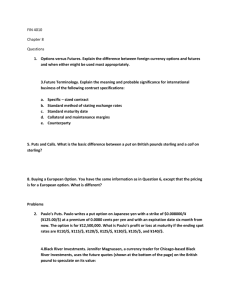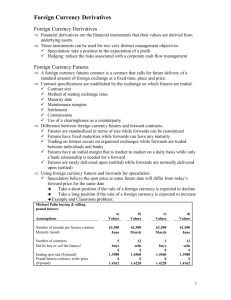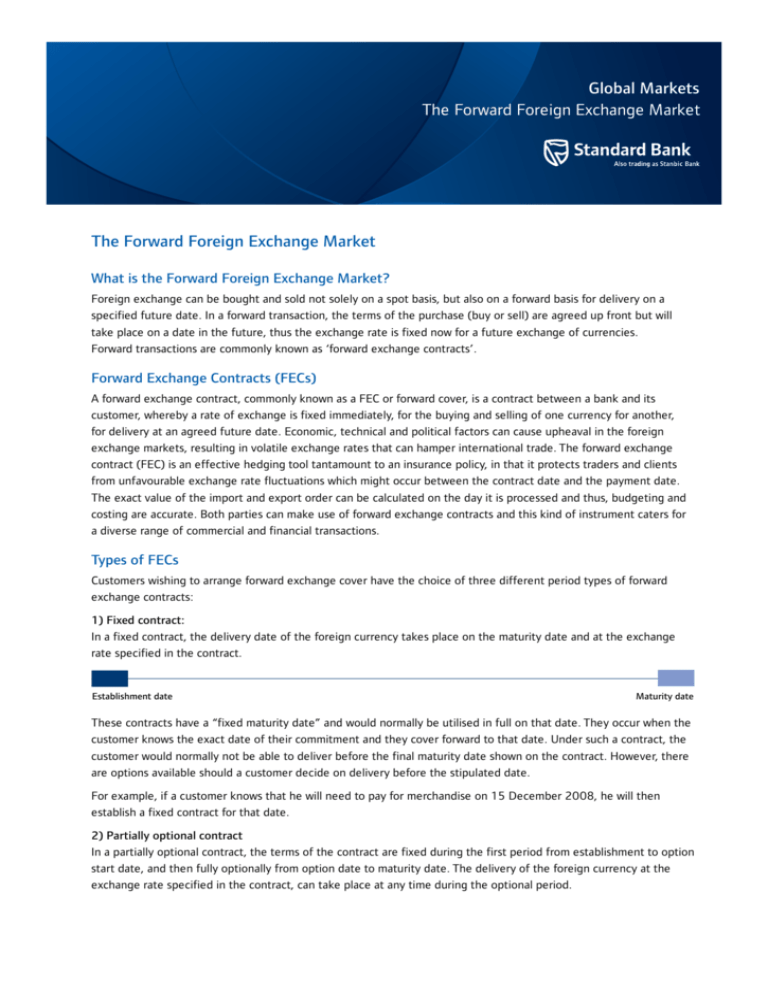
Global Markets
The Forward Foreign Exchange Market
The Forward Foreign Exchange Market
What is the Forward Foreign Exchange Market?
Foreign exchange can be bought and sold not solely on a spot basis, but also on a forward basis for delivery on a
specified future date. In a forward transaction, the terms of the purchase (buy or sell) are agreed up front but will
take place on a date in the future, thus the exchange rate is fixed now for a future exchange of currencies.
Forward transactions are commonly known as ‘forward exchange contracts’.
Forward Exchange Contracts (FECs)
A forward exchange contract, commonly known as a FEC or forward cover, is a contract between a bank and its
customer, whereby a rate of exchange is fixed immediately, for the buying and selling of one currency for another,
for delivery at an agreed future date. Economic, technical and political factors can cause upheaval in the foreign
exchange markets, resulting in volatile exchange rates that can hamper international trade. The forward exchange
contract (FEC) is an effective hedging tool tantamount to an insurance policy, in that it protects traders and clients
from unfavourable exchange rate fluctuations which might occur between the contract date and the payment date.
The exact value of the import and export order can be calculated on the day it is processed and thus, budgeting and
costing are accurate. Both parties can make use of forward exchange contracts and this kind of instrument caters for
a diverse range of commercial and financial transactions.
Types of FECs
Customers wishing to arrange forward exchange cover have the choice of three different period types of forward
exchange contracts:
1) Fixed contract:
In a fixed contract, the delivery date of the foreign currency takes place on the maturity date and at the exchange
rate specified in the contract.
Establishment date
Maturity date
These contracts have a “fixed maturity date” and would normally be utilised in full on that date. They occur when the
customer knows the exact date of their commitment and they cover forward to that date. Under such a contract, the
customer would normally not be able to deliver before the final maturity date shown on the contract. However, there
are options available should a customer decide on delivery before the stipulated date.
For example, if a customer knows that he will need to pay for merchandise on 15 December 2008, he will then
establish a fixed contract for that date.
2) Partially optional contract
In a partially optional contract, the terms of the contract are fixed during the first period from establishment to option
start date, and then fully optionally from option date to maturity date. The delivery of the foreign currency at the
exchange rate specified in the contract, can take place at any time during the optional period.
These contracts are a combination of both fixed and fully optional contracts. They have two dates. The ‘option start
date’ indicates the period prior to this date is a fixed contract.
Establishment date
Option start date
On or before Maturity date
A customer would use this contract if they are certain that they will not require it prior to the ‘option start date’,
however, they need flexibility thereafter.
3) Fully optional contract
In a fully optional contract, the delivery of the foreign currency can take place at the contract rate at any time during
the existence of the contract.
Establishment date
On or before Maturity date
These contracts have an ‘on or before maturity’ date and may be utilised either in whole or in part, at any time
between the establishment date and the maturity date of the contract. These contracts are used when a customer
does not know the exact date of his commitment or if he takes out one contract for multiple transactions.
Pricing
Forward exchange contract rates are based on interest differentials between the countries concerned, and are not
predictions of what the rates of exchange will be in the future. The difference between the forward rate and the
spot rate reflects the interest rate differential between the two currencies. When the foreign interest rate is higher
than the South African interest rate, the foreign currency is said to be at a discount. The forward rate is then lower
than the spot rate. A forward exchange contract will therefore benefit the importer, but be at a cost to the exporter.
Conversely, when the foreign interest rate is lower than the South African interest rate, the foreign currency is said
to be at a premium. The forward rate is then higher than the spot rate. A forward exchange contract will therefore
benefit the exporter, but will be at a cost to the importer. The forward exchange rate may be higher (premium) or
lower (discount) than the spot exchange rate, rarely are they the same. If this were not the case, forward contracts
would be used to earn risk-free profits through arbitrage.
Forward exchange rate = Spot rate + Net cost of carry (Interest differential)
Forward rates as such are not quoted – points are (that is, the premium or discount to the spot rate). One point is
equivalent to 0.0001 of the currency being quoted. When given direct quotations, the forward rate is obtained by
adding the premium to/subtracting the discount from the spot rate (the opposite is true for indirect quotations).
For example, if the dollar/rand is R6.4340-6.4350 spot and the 3-month forward premium is 580-590, the forward
rate will be R6.4920-6.4940. The calculation can be shown as follows:
6.4340 +(580/10000) and 6.4350 +(590/10000).
Application of FECs
The bank will give advice and guidance in selecting the appropriate type of forward exchange contract. We are
responsible for ensuring that the forward exchange contract is issued, delivered, extended, surrendered or cancelled
in accordance with your instructions. (These topics will be covered in next weeks Forex Bulletin). We will ensure
that the transaction complies with the relevant exchange control rulings or has a reserve bank approval reference
number. To apply for an FEC, the customer would need to obtain the relative credit approval, obtain the exchange
control approval where necessary (as described above), Complete a Forward Exchange Contract – General Terms and
Conditions and then sign and submit the application at the international Trade Services centre nearest to them.
Contact details
For further information on any of our products or services:
Forex Relationship Centre
Corporate and Investment Banking Division
Standard Bank
Toll-free tel: 08000-FOREX(36739)
Fax: 011 378 8060
Email: Forex@standardbank.co.za
www.standardbank.co.za
Disclaimer
This document does not constitute an offer, or the solicitation of an offer for the sale or purchase of any investment or security. This is a commercial communication. If you are in any doubt about
the contents of this document or the investment to which this document relates you should consult a person who specialises in advising on the acquisition of such securities. While every care
has been taken in preparing this document, no representation, warranty or undertaking (express or implied) is given and no responsibility or liability is accepted by Standard Bank Group Limited,
its subsidiaries, holding companies or affiliates as to the accuracy or completeness of the information contained herein. All opinions and estimates contained in this report may be changed after
publication at any time without notice. Members of Standard Bank Group Limited, their directors, officers and employees may have a long or short position in currencies or securities mentioned in
this report or related investments, and may add to, dispose of or effect transactions in such currencies, securities or investments for their own account and may perform or seek to perform advisory
or banking services in relation thereto. No liability is accepted whatsoever for any direct or consequential loss arising from the use of this document. This document is not intended for the use of
private customers. This document must not be acted on or relied on by persons who are private customers. Any investment or investment activity to which this document relates is only available
to persons other than private customers and will be engaged in only with such persons. In European Union countries this document has been issued to persons who are investment professionals
(or equivalent) in their home jurisdictions. Neither this document nor any copy of it nor any statement herein may be taken or transmitted into the United States or distributed, directly or
indirectly, in the United States or to any U.S. person except where those U.S. persons are, or are believed to be, qualified institutions acting in their capacity as holders of fiduciary accounts for
the benefit or account of non-U.S. persons; The distribution of this document and the offering, sale and delivery of securities in certain jurisdictions may be restricted by law. Persons into whose
possession this document comes are required by Standard Bank Group Limited to inform themselves about and to observe any such restrictions. You are to rely on your own independent appraisal
of and investigations into (a) the condition, creditworthiness, affairs, status and nature of any issuer or obligor referred to and (b) all other matters and things contemplated by this document.
This document has been sent to you for your information and may not be reproduced or redistributed to any other person. By accepting this document, you agree to be bound by the foregoing
limitations. Unauthorised use or disclosure of this document is strictly prohibited. Copyright 2004 Standard Bank Group. All rights reserved.
Authorised financial services and registered credit provider (NCRCP15)
The Standard Bank of South Africa Limited (Reg. No. 1962/000738/06). SBSA 144911-5/13

